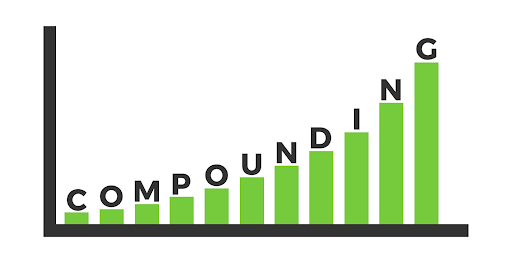Planning for retirement can feel overwhelming, but using tools like a compounding calculator can make the process much easier. This tool helps you visualise the power of compounded growth on your money. Let’s explore how a compounding calculator can help you plan better for your golden years.
What is compounding?
Compounding refers to the process where earnings, such as interest or investment returns, are reinvested to generate additional earnings over time. It creates a snowball effect, as both the initial principal and the accumulated returns grow together. Avenues such as bank deposits offer compound interest, which follows a fixed rate and frequency.
However, mutual funds also benefit from compounded growth. The main difference is that there is no fixed rate of return because returns depend on market conditions and the fund performance. However, as fund returns are reinvested, they potentially generate additional gains, which can lead to exponential growth over the long term. This makes compounding particularly powerful for long-term investors, where even small contributions can potentially grow significantly given enough time and consistency.
Understand how your investments grow over time
One of the biggest advantages of a compounding calculator is that it shows how your investments can potentially grow over time. By entering details like your investment amount, rate of return, investment period and compounding frequency, the calculator reveals how much estimated wealth you can accumulate.
For example, let’s assume you plan make a lumpsum investment of Rs. 10,00,000 in an investment avenue where you expect to earn annualised returns of 12%, with an annual compounding frequency. If you input these figures in the calculator, the tool will instantly estimate that at the end of 10 years, your corpus can grow to approximately Rs. 31.05 lakh and after 20 years, it can grow to approximately Rs. 96.46 lakh. This clarity can motivate you to stay invested for the long term. (The above example is for illustrative purposes only)
Make realistic financial goals
A compounding calculator doesn’t just show numbers—it helps you set estimated achievable financial goals. You can experiment with different inputs like investment amounts, timeframes, or interest rates to see how they impact your corpus.
This allows you to adjust your goals if needed. For example, if your dream retirement corpus seems out of reach with your current investments, you can decide whether to invest more or increase your timeframe to make it happen.
Better visualisation of the impact of time
Time is a crucial factor in compounding. A calculator clearly illustrates how starting early can make a significant difference. The longer you stay invested, the more your returns compound.
For instance, in the example above, the growth between year 1 and 10 is lower in relative terms than the growth between years 11 and 20. Seeing this comparison can motivate early action.
Helps strategise for retirement
Retirement planning is about more than just saving money. It involves ensuring you have enough funds to cover living expenses, health care, and emergencies. A compounding calculator helps you plan how to allocate your investments effectively.
You can use it to evaluate different scenarios, such as what happens if you reduce contributions after reaching a milestone or if you shift from equity mutual funds to safer instruments as you near retirement.
Tracks your progress easily
Many compounding calculators also allow you to track your investments over time. You can periodically check how your actual returns compare to your target and make adjustments as needed.
Encourages financial discipline
When you use a compounding calculator, you get a clearer picture of how small sacrifices now can yield results later. For instance, it shows how reducing unnecessary expenses and redirecting that money to investments accelerates wealth creation in long term.
This tool helps you stick to your savings plan and resist the urge to withdraw prematurely, as you can see how withdrawing disrupts the compounding effect.
Reduces guesswork and stress
Without a compounding calculator, you might rely on guesswork or vague ideas about how much you need to save. This often leads to under-saving or overestimating your returns. A compounding calculator eliminates this uncertainty.
By giving you estimated numbers, it brings peace of mind and confidence to your retirement planning process. You can plan your finances better if you have a clear path towards your goals.
Easy planning with SIP in mutual funds
While making a sizeable lumpsum contribution towards retirement can seem challenging, Systematic Investment Plans or SIP in mutual funds can help you work towards your goals in an affordable and systematic manner.
SIPs are one of the most popular ways to invest in mutual funds in India, thanks to their affordability and convenience. An SIP calculator can help you plan your SIP investment strategy. Some compounding calculators also help you plan monthly investments. Using such calculators, you can see how much you need to invest each month to potentially reach your retirement goal. (Calculators give estimated figures)
So, start using a compounding calculator today and give yourself a head start toward a future well-being.
Mutual Fund investments are subject to market risks, read all scheme related documents carefully.
